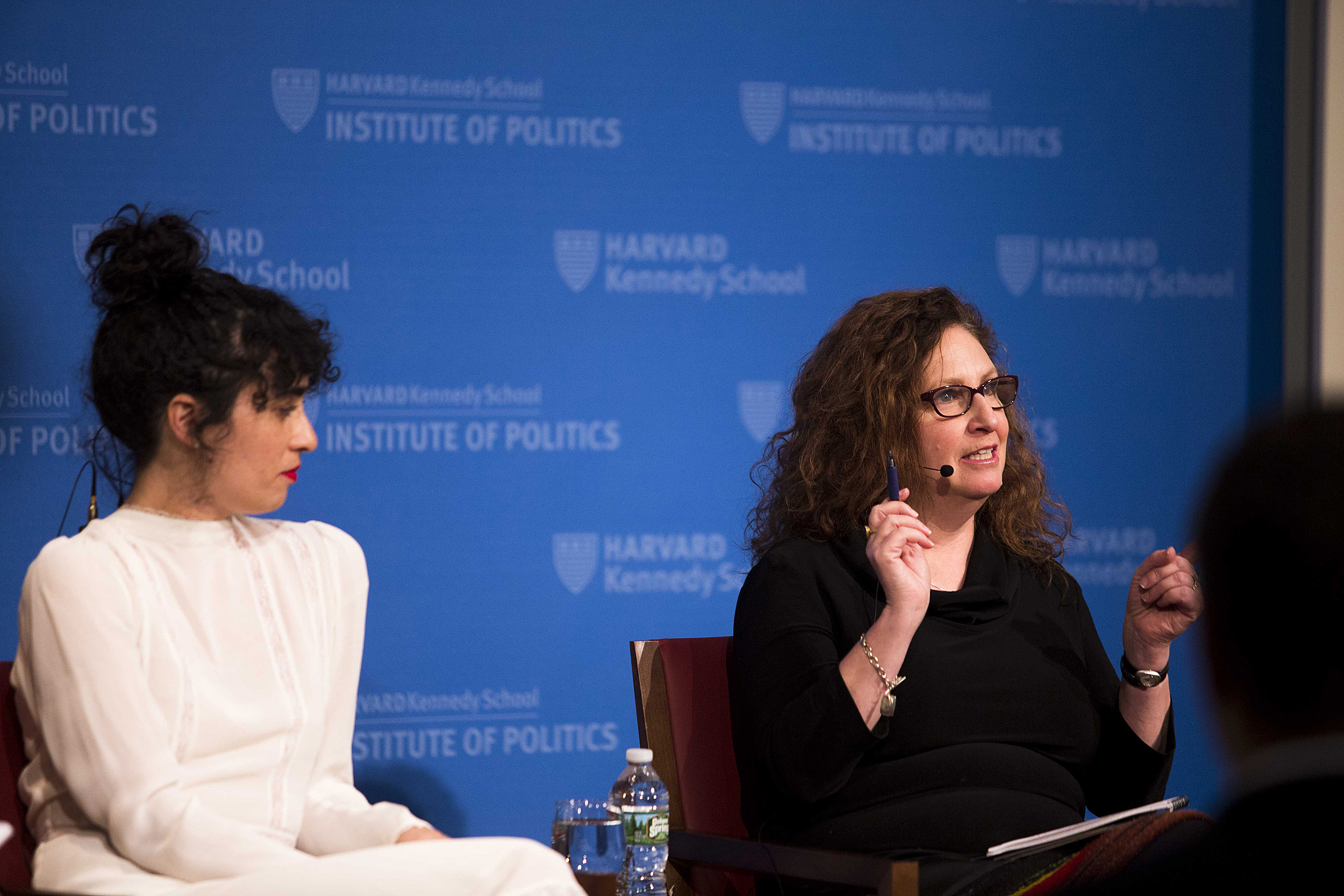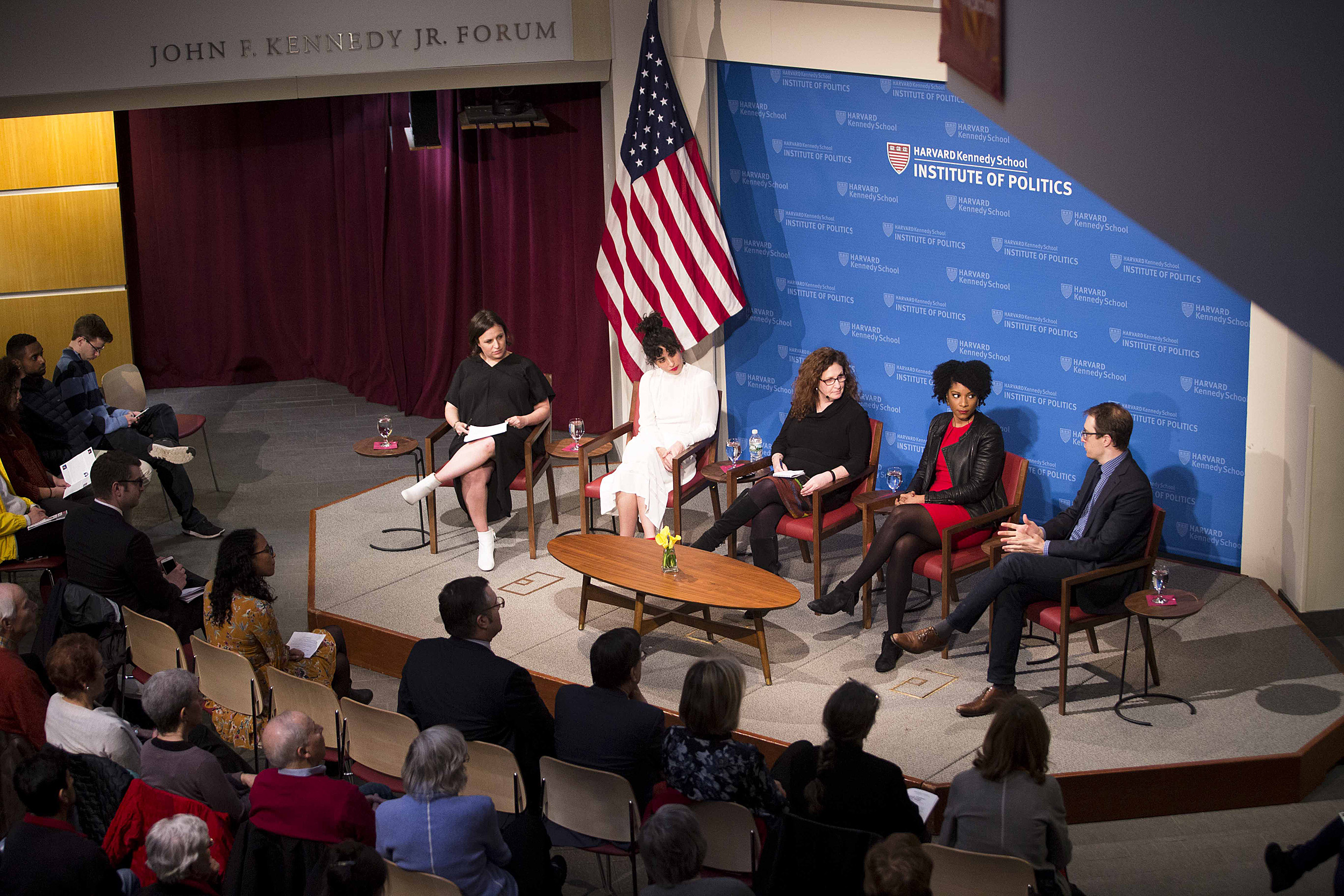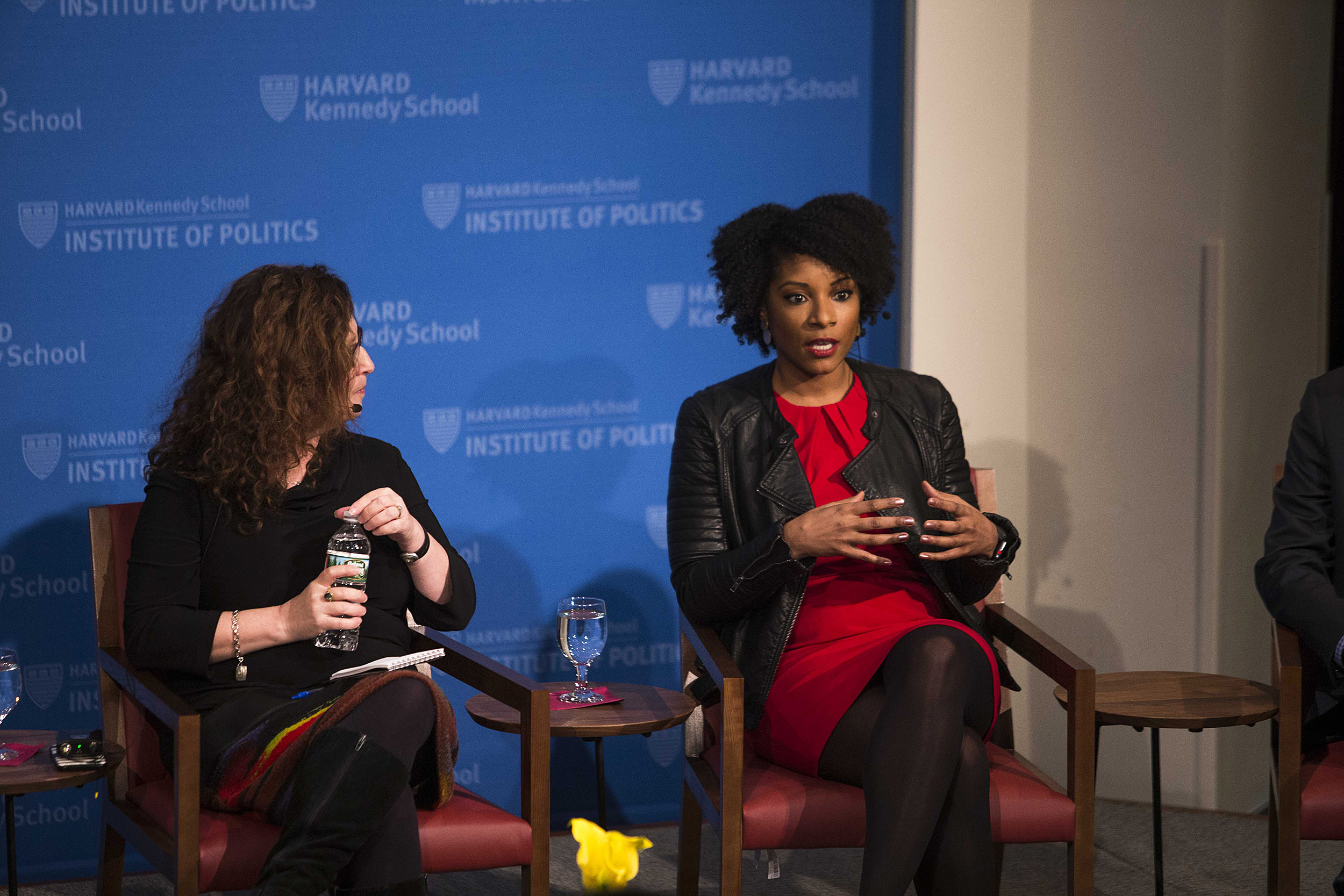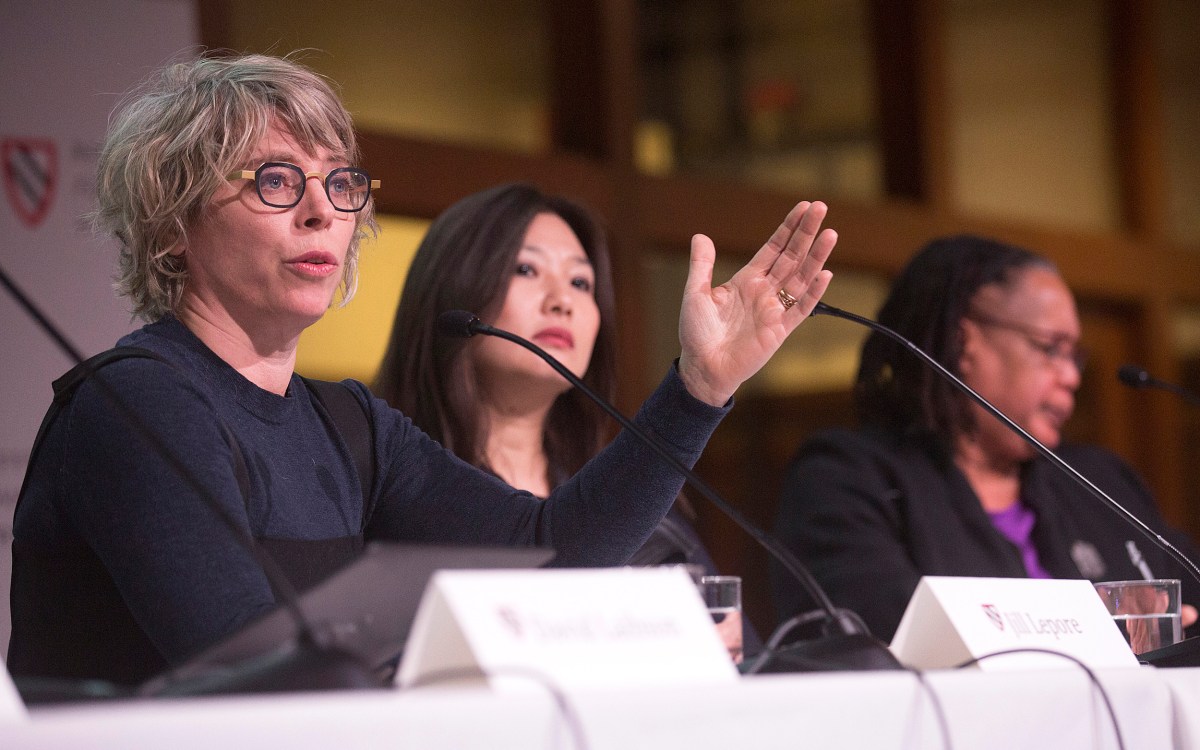
A panel of journalists who cover the #MeToo movement, including Koa Beck (left) and Dahlia Lithwick, discussed the seismic impact the movement has had on the wider culture and what comes next.
Photo by Ke Tang
The new rules of covering sex assault
Journalists’ panel says it’s time to focus on the deeper story
Five months ago, the Harvey Weinstein sexual assault scandal broke open in the pages of The New York Times and The New Yorker, triggering an outpouring of first-person testimonials and claims against others that quickly became known as the #MeToo movement.
Though Weinstein’s alleged offenses were extreme, the universality of his accusers’ experiences seemed to empower many women who had been unwilling or unable to come forward before. It also ignited media outlets that either had set aside reporting on sexual misconduct because they couldn’t get enough credible sources to publish, or hadn’t been interested in pursuing the stories until the Weinstein scandal began garnering worldwide attention.
Suddenly, every outlet was hunting down its “Weinstein,” and since then, stories about high-profile men, including “Today Show” host Matt Lauer, CBS news anchor Charlie Rose, former Senator Al Franken, actor Kevin Spacey, and many others have become so routine that their narrative is almost formulaic: “Famous rich man used his power and money to sexually harm women or men for years without consequences. Now he’s been fired.”
A panel of journalists who have been covering the #MeToo movement took a rare breather Tuesday evening at a discussion at Harvard Kennedy School to reflect on the breathtaking impact the Weinstein story has had on the wider culture but also on the profession, and to consider where the movement may be headed and what work reporters have before them on this long-overlooked issue.
Moderator Genevieve Roth, a spring 2018 Shorenstein Center Fellow, asked Koa Beck, editor in chief at Jezebel; Dahlia Lithwick, a legal reporter and senior editor at Slate; Zerlina Maxwell, senior director of progressive programming for SiriusXM radio; and Vanity Fair’s Gabriel Sherman whether — given the human tendency to apply the “bad apple” label to every new revelation about a sexual abuser, as well as the episodic nature of the #MeToo coverage — reporters and society as a whole are hindered from confronting the systemic problems that underlie sexual misconduct.

Moderator Genevieve Roth and panelists Beck, Lithwick, Zerlina Maxwell, and Gabe Sherman discuss with a full JFK Jr. Forum listening in.
Photo by Ke Tang
Sherman, author of a best-selling 2014 biography of Fox News chief Roger Ailes, who was forced out of his job in 2016 after anchor Gretchen Carlson sued him for sexual harassment, said that as the story developed, he realized the bigger news was about the vast system Ailes had created around him: a “whole chain of enablers” made up of deputies, the network legal department, draconian nondisclosure agreements to silence potential accusers, and private investigators to smear women who came forward.
“I think that is where the fundamental change happens, because yes, there are predators, there are bad apples out there, but they’re only as powerful as the space in which they operate,” Sherman said. “People like Roger Ailes or Harvey Weinstein or Matt Lauer, any of these very powerful men operating in this corporate environment, were able to use that corporate environment and the tools, the levers of that environment, to abuse women.”
Lithwick said the “desperate desire” of institutions to declare that an accused is a lone bad actor whose dismissal will show the system is working is both understandable and a huge part of the problem.
“It means that all of the processes that you’re seeking to put in place, to figure out how is it that we are 40, 50 years into a legal architecture that’s supposed to protect women … is so utterly failed as a legal architecture that we’re doing this kind of internet hashtag parallel justice system? It’s insane.
“Instead of saying what is systemically broken, every system that is called upon to assess how it dealt with things tends to say, ‘Hey, we got rid of him. No problem here!’ The deeper conversation we’re going to have to have isn’t [about] the bad apples, it’s the apples in the middle. There are a lot of not-awful-apples-but-still-creepy-apples in the middle,” she said.
That the behavior of many of the most infamous #MeToo accused had been long talked about in industry circles suggests that true accountability will have to come from outside corporations, courthouses, and universities.
“I just think the presumption that institutions are going to police themselves consistently fails us,” Lithwick said.


Beck, Lithwick, and Maxwell discuss the impact of #MeToo on the expected turnout for the 2018 midterm elections. “We can no longer be passive observers of what’s going on in our country; we have to be more engaged and that also includes telling the truth about sexual assault,” said Maxwell.
Photo by Ke Tang
In addition to covering the men who have not yet been publicly accused, the panelists agreed that reporters need to expand their attention beyond the famous predators. Where to begin? A good start would be more stories that focus on women of color or women in lower-status jobs who can’t hire a lawyer and create a paper trail or who don’t have the connections to get the attention of the national media; stories that consider the role that men can and should play in the movement; and pieces that uncover what some are doing outside the legal system to stop workplace harassment, they said.
Maxwell, a communications veteran of Hillary Clinton’s 2016 presidential campaign and a political analyst for MSNBC, said that with a record number of women running for office this November, pundits have already been referring to 2018 as the “#MeToo Elections.”
“I think why you see so many women speaking out and why you see so many people stepping up to run for office is because there’s power in numbers. When you see other women coming out to tell their story about the same person who assaulted you, then you’re more likely to be believed,” she said. The end result is the realization that: “We can no longer be passive observers of what’s going on in our country; we have to be more engaged and that also includes telling the truth about sexual assault.”
Beyond the splashy and sometimes lurid headlines, how #MeToo creates lasting change likely turns on some fundamental elements, the panelists said.
“We have not quite figured out how to invite men into this conversation,” said Lithwick, who wrote about the rare resignation of an appellate judge from the federal bench last December after he was accused of sexual misconduct. Many men who called her with news tips about sexual harassment in the federal judiciary refused to speak on the record, saying the matter was a place for women’s voices to dominate. Lithwick’s not convinced that’s true.
“How impactful this [movement] is in the long term — or whether it’s another 1992 that comes and goes — turns on finding a space for men in this conversation,” she said.
Sherman, the lone male panelist, said the volatile social media environment makes it particularly fraught for men to wade into the movement in a public way, even when they’re supportive.
“This is a double-edged sword. It’s incredibly liberating for speech, but the downside is too much democracy can also be silencing of speech. There is a chilling effect for men, especially white men,” when the default position for Twitter is a mob mentality.
“To invite men into the conversation, you have to be willing to hear points of view that you don’t want to hear,” he said. “The way to bring more men in is not to say, ‘I got you. Now I’m going to have thousands of people tweet at you.’”






